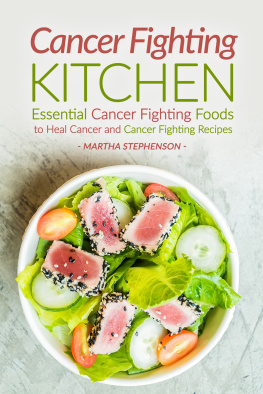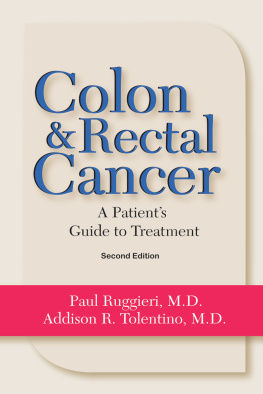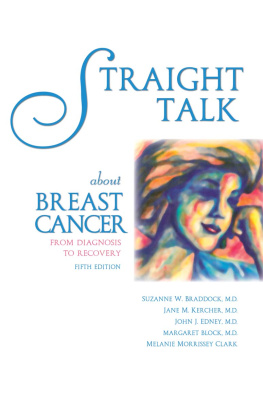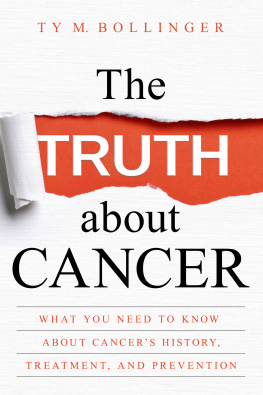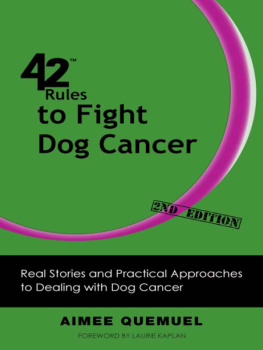my cancer year
A SURVIVORSHIP MEMOIR
for Paula,
Josh and Jesse,
forever
my cancer year
A SURVIVORSHIP MEMOIR
curtis pesmen

My Cancer Year: A Survivorship Memoir by Curtis Pesmen
Copyright 2013 by Curtis Pesmen
Published by Tatra Press LLC and BoCo Media.
All rights reserved. No part of this book may be used or reproduced in any way without written permission from the publishers, except in cases of brief quotations in reviews.
Library of Congress Control Number: 2013947659
For media and special sales inquiries, please contact Chris Sulavik
Tatra Press LLC
4 Park Trail
Croton-on-Hudson, NY 10520
www.tatrapress.com
tatrapress@gmail.com
Jacket design by Mimi Bark-Weiss.
Book design by Isabella Piestrzynska, Umbrella Graphics.
Distributed by Midpoint Trade Press.
Printed in the United States of America.
ISBN: 978-0981932170
Also by Curtis Pesmen
How a Man Ages
What She Wants: A Mans Guide to Women and Their Bodies
Your First Year of Marriage
When a Man Turns Forty
Your Prostate Cancer Survivors Guide
table of contents
Authors Note: Though not exactly born as a blog, a first-person account of a life-threatening colon cancer case appeared over six months time, in the pages of a national magazine. The public/private cancer case happened to be mine.
The series appears in ; excerpts also reappear, as reruns on occasion through the book, for narrative flow. In addition, names of certain survivors and related details have been changed for privacy reasons.
foreword
Sometimes numbers speak louder than words. Sometimes they fairly shout when you dont abbreviate them. So this year, more than 1,600,000 Americans will learn they have cancer. This equates to more than 80 Beyonc or Bruce Springsteen sold-out shows in New Yorks Madison Square Garden, in terms of counting bodies. And bodies do count. Theyre why I wrote this book.
I also wrote it to vent the fears and frustrations of one single cancer patients life, and to stay connectedto those closest to me, to my friends, to my job, and to the cancer survivor community that I didnt realize I would be part of someday.
As for community, and what its grown to mean to me, I wont soon forget a letter I received years ago from Sherry Ribble, a health care provider from Honea Path, South Carolina. I didnt know Sherry at all, but she had read some of my words in Esquire magazine and said:
I work at an endoscopy center; we do colonoscopies and EGDs, which check the esophagus, stomach and duodenum for diseases. It is not unusual for us to do 30 or more cases in a day. We see people diagnosed with cancer almost on a daily basis. Working as we do, we only see the patients when they are diagnosed and their reactions at that moment. Pesmens articles have touched me and moved me in so many waysI have cried, been angry at the incompetence of his first doctor, felt guilty because of how little we are able to do for the patient at that stage, and been amazed at the courage of Pesmen and his wife to be willing and able to share these intimate moments with us.
Call me fortunateand humbledthat I am able to share some of these personal cancer experiences, still. Heres hoping, then, that at least a little bit of my good cancer year can help you or a loved one through what surely may become an unforgettable, incredibly tough, but an also oddly rewarding, time.
introduction
if i knew then
Of all the scary scenarios and tough talk I heard in the throes of my good cancer year, the most frightening words were not, You have cancer. No, not those three. The scariest words I heard rolled out of the mouth of a 20-something cancer doc, an apprentice radiation oncology resident who wore a starched white coat while doing Saturday rounds in the sub-floor unit of a busy San Francisco cancer center; who approached my nervous wife, Paula, and me, with a chart in his hands and not a worry line on his forehead and nonchalantly said: Sorry about the bad news.
Whoa-what? Huh? Epochal. Life-altering (again). Terrifying (anew). Because what he was saying was now worse than what Id heard six weeks before, which was bad-shock-enough. But back then, when I got my Stage 3, it was delivered by a team of doctors, one of whom had spent more than an hour with us, uninterrupted and early on, laying out what we would face in the weeks and months to come. Back then Id gotten the news from a team that had compared notes and delivered a diagnosis when we all thought my cancer was, well, locally advanced but also contained.
This apparent Bad News was different.
The thing is, Id had a fall the day before, while awaiting my turn under the radiation gun, while undergoing 24/7 pumped chemo simultaneously. Fainted, actually. Crumpled against a wall, then down onto a tile floor. Then spent hours in the emergency room getting tested and interviewed and prepped for an unscheduled, unsettling session inside the MRI (magnetic resonance imaging) machine, all so that my medical team could have an updated picture of my compromised health status via a closer look at my brain. (Has it spread? was thought but unsaid.)
But just before: Here comes Doc-in-Trainingwith my whole-body future in his handsand hes read a report that said something about two spots in or on my skull. Seems he knows lots more than my wife and I do just now. And then he drops the Nuke about the bad news. Without first checking with his supervisors. Without any hint of seasoned bedside manner.
Sorry about the bad news, he said, just once. But I kept hearing it over-and-over that morning, at least until we could talk with my radiation oncologist, the one whod ordered the MRI the day before, the doctor whom Id come to trust so far-so fast, because she didnt seem afraid of this whole diagnosis. Shed seemed confident enough that this cancer thing was corralled down below in my midsection. In my colon. More precisely: in my rectum. But that it hadnt spread. Still, protocol called on her to order the brain pictures, because, as a colleague explained: We have to rule things out.
Her senior colleague also had said: Sometimes when you go looking around, with all the new equipment, youre bound to find something. Even if its just ditzels. Even if they may seem to be bad news when they arent. Ditzels, it turns out, are stray matter, or shadows, or harmless scar tissue that may have come from a bump to the head 15 years ago. Or from a baseball that knocked me down with a concussion more than 30 years ago, back in my home town near Chicago. Main thing is, was: Ditzels, in context, arent cancer. And so they may not be bad, or horrid, news.
Turns out the spots on my MRI were in fact mere ditzels. A doctor who did the reading of the images had diligently noted them on the report; and said they should be followed. But the doc did not say they were cancerous. Then the Saturday morning delivery guy bungled delivery of the news, assuming it was Bad when it wasnt (yet). Then we got another opinion. And I went on to have a couple of calm, reassuring discussions with my team of doctors about the false sense of alarm wed all just lived through. Cancer care is not automatic.
I went back to my regularly scheduled program: chemo, radiation, hydration (more waterto help prevent future fainting spells caused by all this), the works. I went back older, wiser, and far-more schooled in the importance of getting a second, or a third opinion, no matter the cost or inconvenience.
And sometimes on an unscheduled, stop-in-your-tracks Saturday.
Next page

